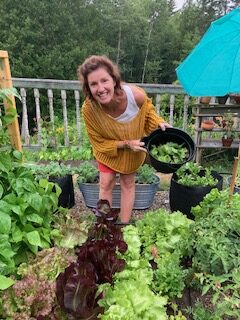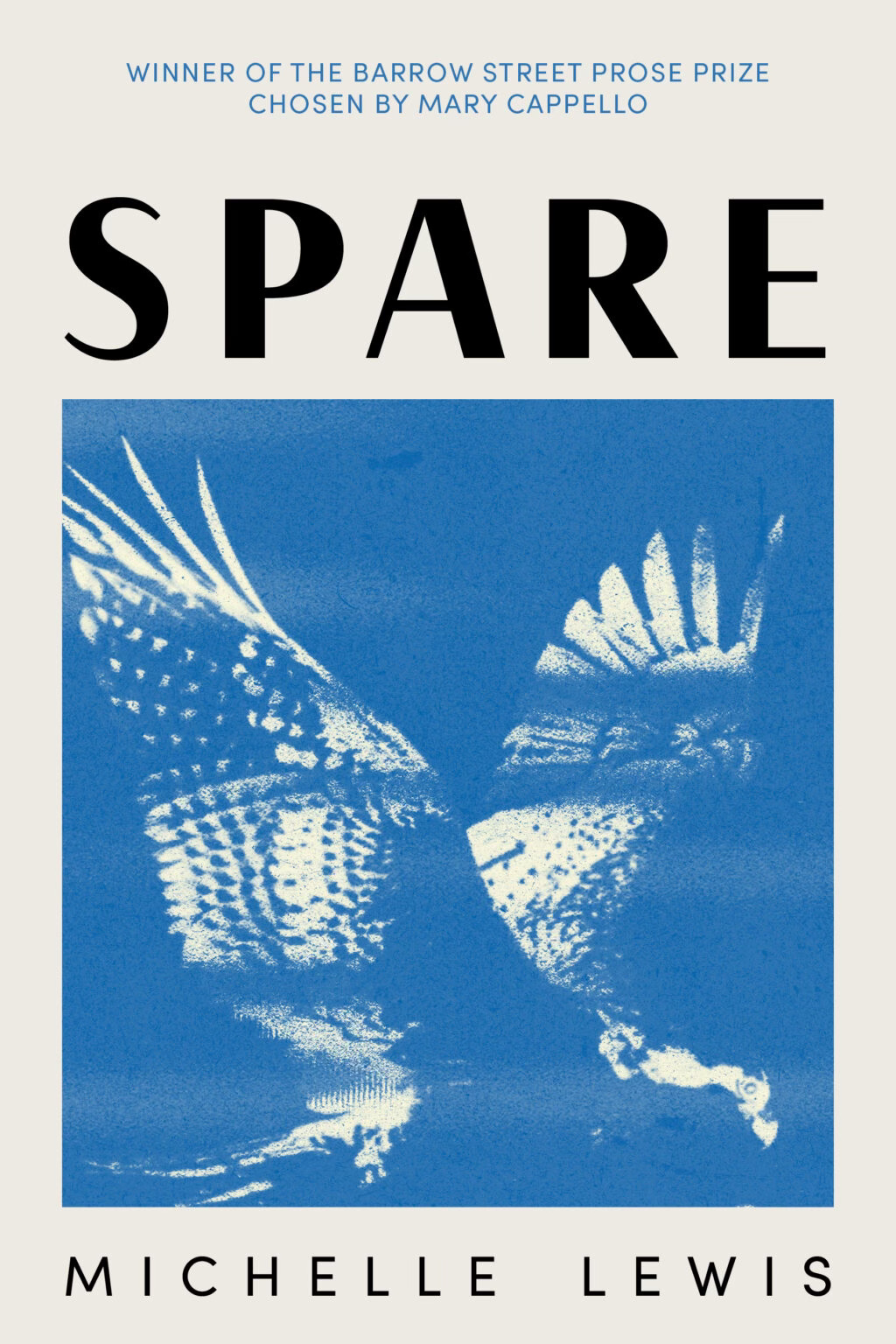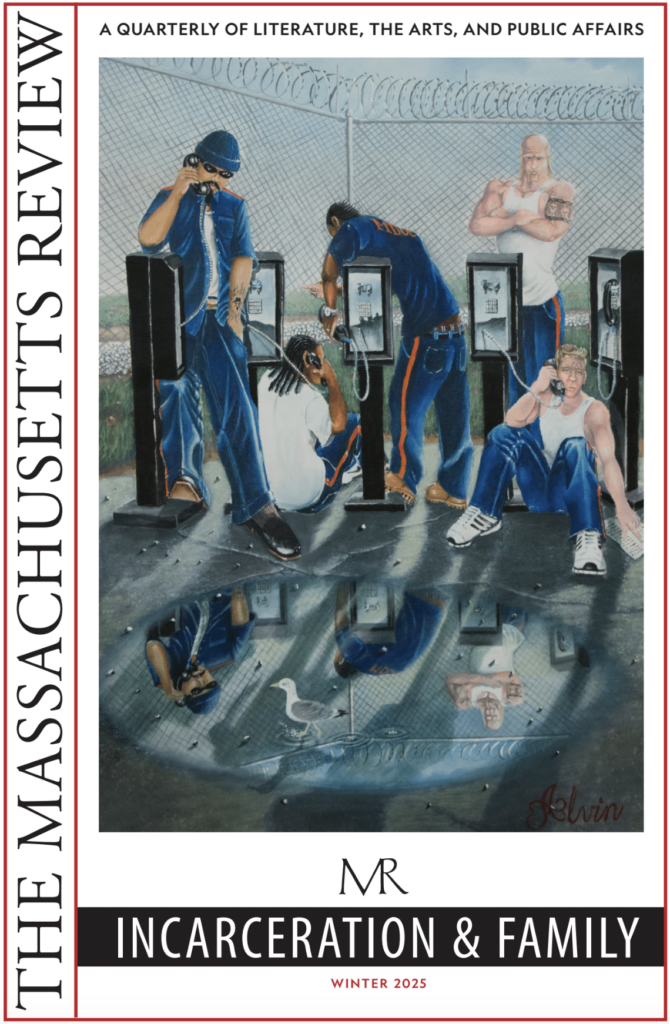10 Questions for Michelle Lewis

To praise what knows only dark
is to praise the seed before its soil-ceiling
canopies. The belly, too,
moon that parallels the moon,
tooth of a new bud that
curls from its green casing.
Quaint, too playful, word
—from Michelle Lewis’ “Disaster Ode,” Volume 66, Issue 2 (Summer 2025)
Tell us about one of the first pieces you wrote.
In my early twenties, a fairly well known publication awarded me a runner-up prize of $500 for a poem called Still Life With Horses. I used to get by because of how bad I was in some ways — I reached for metaphors because I really was reaching for words, and I used lyric to skirt truth because I wasn’t yet telling truths. The resulting work read weird in a way that occasionally got over. The editor wrote an intro in the issue about how slim the pickings for the contest were and what a low point we were at creativity. That’s how I remember it, anyway. I bought a Brother word processor with one of those little dark 3-line screens with the winnings, and it was the most wonderful and encouraging thing that had ever happened to me. I was a poet…though also, apparently, part of the collapse of civilization.
What writer(s) or works have influenced the way you write now?
Olena Kalytiak Davis gave me permission to write in a way that I felt in my bones. I was voracious for her work and in disbelief I’d found something I didn’t know I was looking for. It felt naked and scary. Larry Levis gave me a way to think about language and how to write with elegance and humanity. He also gave me a deep love for the longer poem, the poem that goes further. And Sylvia and Emily and Adrienne and Gwendolyn and Sharon, oh god, Sharon!
When I first came to my mentor, Arielle Greenberg, I had poems that were adept enough at language to get by. She saw through me immediately, and told me I needed to say true things, not just use language as fireworks. From there, I wrote about risky, true, uncomfortable things, things I believed. Then, language, even if it was elliptical or disjunctive, every word and every image had earned its place, and that was a framework that created great freedom. That changed everything—everything—about my life as a writer.
What other professions have you worked in?
I work in digital marketing in a role that’s part writing and part data. Poetry to me is math, or a map, or a Jenga game, and involves having a data mind, much more so than non-poets realize, I think. It’s meter and prosody and form and decision making. It’s research. It’s the Key Performance Indicators plotting a graph of intellect, emotion, architecture, sonics, and language. It’s about seeing through false metrics and masked anomalies. Analytics is a comfortable place for me in the digital world and a half-step away from writing poetry.
What inspired you to write this piece?
Disaster Ode is a COVID-coded poem, although it could telegraph any general or personal disaster. At the time I wrote it, my poetic preoccupation was about how to love and have pleasure in places where it was hardest to love and have pleasure. I was also writing a series of poems where I imposed three formal constraints, one of which was that the poem must include a reference to an interior or exterior space. Boundaries of space, especially when paired with desire and secrecy, would create tension that heightens the stakes of the poem.
This was to be a praise poem, an ode, to something underserving of praise, so that’s the system the poem is operating within. The nod to the outside world would have become inevitable in the development of it, shifting the poem from an ecstatic utterance to something more menacing. There is danger in the poem that is whispered and hovering outside the space, creating the pressure system—the urgency, the risk, the knowledge that there is ultimately no escape from reality, or what is beyond our little redoubt, and ultimately, mortality.
I had a hard time loving this poem for a long time. Mostly for reasons that are in the poem. Even now it feels strange to me, but I never let it go because some parts of it were saying things I wanted to say, and I liked being able to say. It pays homage to a time when intimacy and danger were in open conflict across the world and playing itself out in these tangible ways, rather than waging their war under the surface, the way they often do.
Is there a city or place, real or imagined, that influences your writing?
As I mentioned, I have a series of poems governed by self-imposed constraints, and one of those constraints is that the poem references an interior or exterior boundaried space. I’m drawn to rooms and enclosures, for their realism, their claustrophobia, and the built-in tension they hold: their persistent desire to escape them.
I’m sort of haunted by the imagined architecture in The Grand Hotels of Joseph Cornell by Robert Coover, and of the mind-blowing Lorrain Hotel in Kirstin Kaschock’s Confessional Sci-Fi. They blur the line of structure and psyche. This sort of place, though not specific, has been a part of my work a lot recently. Constraint lives there, transformation is hovering there. It’s also perfect that poems themselves enact this spatial tension within their metaphorical architecture, bound as they are bound by four walls. They have an intrinsic desire for spaciousness that can feel wanton, transgressive, and that really appeals to me enough to return to over and over.

Is there any specific music that aids you through the writing or editing process?
It sounds really lovely to do that, I must try it. I’d probably put on Yo-Yo Ma’s Bach cello suites, or Robert Glasper, or Jonwayne if I did. I don’t write with music. I write with memory, anxiety, urgency, and deadlines. I’m bricklaying. My favorite music is the low drone of a rum-addled card game going on one floor below. It’s something from childhood. People existing, but remotely. That’s soul music—it’s the music of productivity and focus.
Do you have any rituals or traditions that you do in order to write?
I aspire to be the person who edits on the fly with their manuscript always open, and since I don’t do that, I suppose I do have my rituals. Usually, it’s circling the idea of complete immersion like a dog getting ready to lay down. That might be clipping the rose bush or taking some weird cuttings for an oddball arrangement, and eventually, when I feel sufficiently misaligned with time and usefulness, going all in. Making the body uncomfortable enough that the mind steps in I think is the underpinning move. Just sort of giving up on everything else, then writing. How else to tell the truth? All else must be a little lost. Performance has to have failed so the self can step in.
Who typically gets the first read of your work?
I do nothing without Arielle having read my work. I know the pain points, often, but I don’t know I know it until I hear it from her. It’s the difference between the poker chips and the cash. There is something powerful in having someone you trust utterly read your work, someone who respects your project and has knowledge of and values your unique intention. It opens the next door.
If you could work in another art form what would it be?
I often daydream about being a large scale sculptor. I think this might be common for writers. What must it be like to be out of your chair and still call it work? To stand, hands on hips, staring at something formidable that you ideated and made. The grime of your medium actually on your clothes? How satisfying! It’s so tangible. I have an artist friend who is always moving large canvases around her workspace, and that constitutes a day’s work. It’s enviable, having work that you move and feel its weight.
What are you working on currently?
I’m writing a real sentence-after-real-sentence nonfiction book. My first book was poetry, my new book Spare is a lyric memoir, so a straight prose book feels like a fitting evolution in my quest not to obscure the truth. It’s currently called The End of Me, and it’s a collection of connected essays that weave memoir and cultural criticism that explores the intersections of illness, sexuality, and female embodiment. One thread examines how the medical system fails women, especially around invisible pain and shame. Another grapples with how being diagnosed with anal cancer collided with middle age and a complicated sex life. It’s the rawest, riskiest work I’ve ever written. I feel wholly capable of completing it, and at the same time it feels utterly beyond me.
MICHELLE LEWIS is the author of Spare, which won the 2023 Barrow Street Press Prose Contest. She is also the author of Animul/Flame (Conduit Books & Ephem-era), which was the winner of the 2018 Marystina Santiestevan First Book Prize. Her poetry has appeared in Bennington Review, Indiana Review, Copper Nickel, and Denver Quarterly, among others. She lives in Maine.



